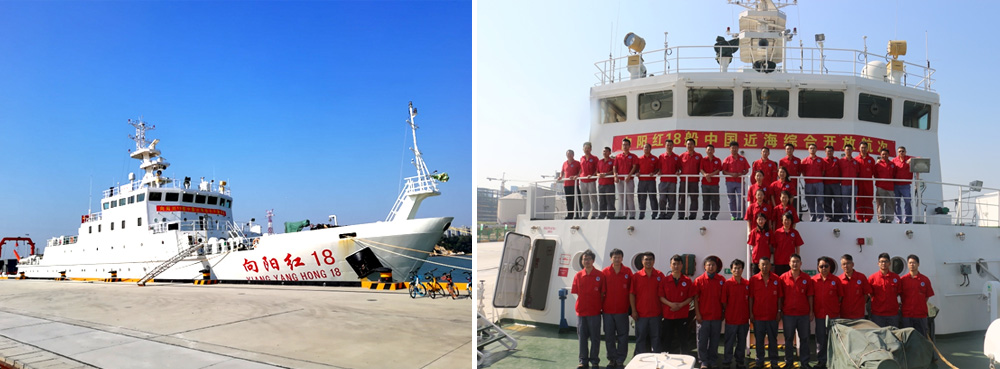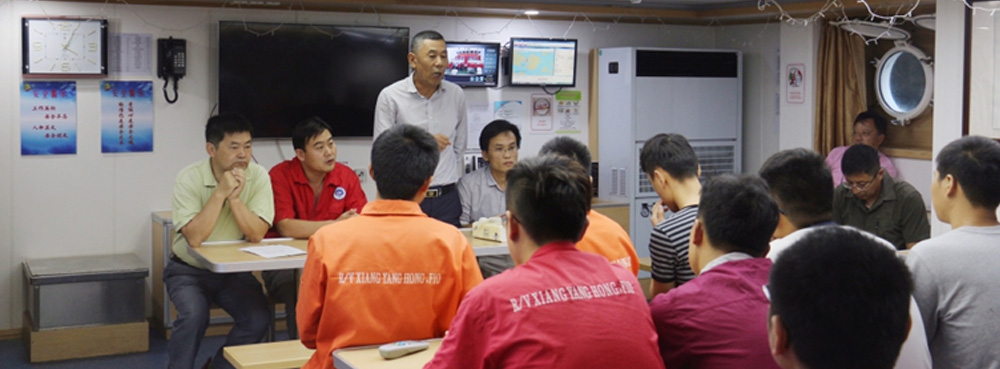Start a New Journey of Multidisciplinary Cooperative Observation in China's Eastern Coastal Areas
| -- Our 2018 Comprehensive Public Cruises Set Sail The eastern coast of China is one of the land shelf waters with the densest human activities in the world. The land close to it gives birth to the 22% of the world's total population. All this has endowed the ocean with extremely high scientific and human values. The continental shelf waters have unique regional oceanographic characteristics with wide area and complex topography, distinct seasons, and variable coastal runoffs. It has become a hot spot of marine comprehensive research in China or even in the world. Currently, the national and local government has been keeping increasing the investment on ocean observation and research. However, under the influence of marine complex, as well as the limitations of the observation condition, our available meteorological, hydrological, geological and biochemical observations in the field remain limited, especially at the present time when the impact of human activities on the marine environment and the demand for resources is increasing, the comprehensive offshore study is particularly important.
In line with the principle of discipline coordination, resource sharing and intensive efficiency, while making full use of the advanced scientific research platform "Xiang Yang Hong 18", the First Institute of Oceanography, SOA has integrated the scientific research missions of various disciplines in the Bohai sea, north Yellow sea, south Yellow sea and East sea, after several rounds of expert argumentation and repeated research by leaders, and launched a comprehensive public sea voyage of China's offshore, namely, the autumn voyage of 2018.
"Xiang Yang Hong 18" of our institute set sail from Xiamen Dongdu wharf on Oct 7, to above mentioned waters to carry out multidisciplinary investigation and comprehensive research on hydrology, geology, chemistry, biology and remote sensing. The voyage is expected to take 35 days and cover more than 4,200 nautical miles.
From the successful completion of China's first comprehensive marine scientific expedition around the world to the opening of the new voyage of multi-disciplinary cooperative observation in the eastern coastal region of China, the global and regional scientific research system of our institute for the oceans will be further improved. In the voyage, the survey has been performed in different areas from "yellow water" to "green water", then "blue water". It will focus on typical sea areas, hotspot areas and key interfaces in relevant sea areas with the following highlights:
(1) Integrate the national needs with scientific research with the scientific issues that aim at the urgent needs of the country as guidance. Systematically explore the impact of water exchange and circulation systems in eastern China on China's coastal ecological environment, enrich and improve the cognition of variation rules and key processes on China's offshore ocean, systematically understand the formation, status and development process of China's offshore ecological environment and control mechanism.
(2) Under the guidance of marine system science, realize high integration of disciplines such as hydrology, geology, chemistry, biology, meteorology and satellite remote sensing to represent the whole process of marine system changes.
(3) Further analyze the hot issues of marine ecological environment based on the concept of real-time observation of multiple circles of quasi-synchronous and comprehensive stereoscopic "sky-ocean-land" with fixed sections. Conduct synchronous observation with the HY-1 satellite and Tiangong-2 space laboratory, and open a new mode of cooperation and interaction in offshore scientific research, acquire the ocean - atmospheric optical parameters to provide technical support for remote sensing algorithm research and remote sensing data application.
(4) Focus on ecological and environmental issues of public concern and carry out surveys on new pollutants such as micro-plastics. Understanding of related scientific issues such as composition, stock, distribution characteristics and sources of micro-plastics under the multiple impact of abundant human activities etc.
This is the first time that a multi-disciplinary and multi-technological quasi-synchronous observation of "substrate + water + atmosphere + remote sensing" has been carried out in the coastal area of eastern China, such integrated coastal observation and research is also rare in China. This integrated observation and systematic study of China's coastal waters will provide valuable first-hand information for further exploration of the status quo and environmental evolution of China's offshore natural resources, in-depth study of the interaction between land and ocean, and related research on hot issues of the Marine environment. In the future, the institute will continue to promote the three-dimensional coastal observation and comprehensive experimental research, inject new impetus into the construction of China's Marine ecological civilization, and provide strong support for the scientific theory of natural resources.
|



 "Xiang Yang Hong 18" set sail from Xiamen Dongdu wharf Group photo taken before "Xiang Yang Hong 18" setting sail
"Xiang Yang Hong 18" set sail from Xiamen Dongdu wharf Group photo taken before "Xiang Yang Hong 18" setting sail